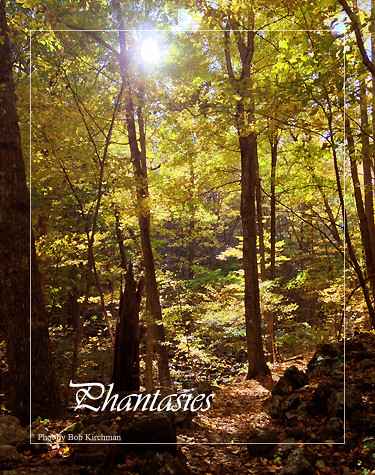
Volume XV, Issue XVIII
Phantasies
By George MacDonald, Chapter 5
And she was smooth and full, as if one gush
Of life had washed her, or as if a sleep
Lay on her eyelid, easier to sweep
Than bee from daisy."
~ Thomas Lovell Beddoes' Pygmalion.
Sche was as whyt as lylye yn May,
Or snow that sneweth yn wynterys day."
~ from "Romance of Sir Launfal".
I walked on, in the fresh morning air, as if new-born. The only thing that damped my pleasure was a cloud of something between sorrow and delight that crossed my mind with the frequently returning thought of my last night's hostess. "But then," thought I, "if she is sorry, I could not help it; and she has all the pleasures she ever had. Such a day as this is surely a joy to her, as much at least as to me. And her life will perhaps be the richer, for holding now within it the memory of what came, but could not stay. And if ever she is a woman, who knows but we may meet somewhere? there is plenty of room for meeting in the universe." Comforting myself thus, yet with a vague compunction, as if I ought not to have left her, I went on. There was little to distinguish the woods to-day from those of my own land; except that all the wild things, rabbits, birds, squirrels, mice, and the numberless other inhabitants, were very tame; that is, they did not run away from me, but gazed at me as I passed, frequently coming nearer, as if to examine me more closely. Whether this came from utter ignorance, or from familiarity with the human appearance of beings who never hurt them, I could not tell. As I stood once, looking up to the splendid flower of a parasite, which hung from the branch of a tree over my head, a large white rabbit cantered slowly up, put one of its little feet on one of mine, and looked up at me with its red eyes, just as I had been looking up at the flower above me. I stooped and stroked it; but when I attempted to lift it, it banged the ground with its hind feet and scampered off at a great rate, turning, however, to look at me several times before I lost sight of it. Now and then, too, a dim human figure would appear and disappear, at some distance, amongst the trees, moving like a sleep-walker. But no one ever came near me.
This day I found plenty of food in the forest--strange nuts and fruits I had never seen before. I hesitated to eat them; but argued that, if I could live on the air of Fairy Land, I could live on its food also. I found my reasoning correct, and the result was better than I had hoped; for it not only satisfied my hunger, but operated in such a way upon my senses that I was brought into far more complete relationship with the things around me. The human forms appeared much more dense and defined; more tangibly visible, if I may say so. I seemed to know better which direction to choose when any doubt arose. I began to feel in some degree what the birds meant in their songs, though I could not express it in words, any more than you can some landscapes. At times, to my surprise, I found myself listening attentively, and as if it were no unusual thing with me, to a conversation between two squirrels or monkeys. The subjects were not very interesting, except as associated with the individual life and necessities of the little creatures: where the best nuts were to be found in the neighbourhood, and who could crack them best, or who had most laid up for the winter, and such like; only they never said where the store was. There was no great difference in kind between their talk and our ordinary human conversation. Some of the creatures I never heard speak at all, and believe they never do so, except under the impulse of some great excitement. The mice talked; but the hedgehogs seemed very phlegmatic; and though I met a couple of moles above ground several times, they never said a word to each other in my hearing. There were no wild beasts in the forest; at least, I did not see one larger than a wild cat. There were plenty of snakes, however, and I do not think they were all harmless; but none ever bit me.
Soon after mid-day I arrived at a bare rocky hill, of no great size, but very steep; and having no trees--scarcely even a bush-- upon it, entirely exposed to the heat of the sun. Over this my way seemed to lie, and I immediately began the ascent. On reaching the top, hot and weary, I looked around me, and saw that the forest still stretched as far as the sight could reach on every side of me. I observed that the trees, in the direction in which I was about to descend, did not come so near the foot of the hill as on the other side, and was especially regretting the unexpected postponement of shelter, because this side of the hill seemed more difficult to descend than the other had been to climb, when my eye caught the appearance of a natural path, winding down through broken rocks and along the course of a tiny stream, which I hoped would lead me more easily to the foot. I tried it, and found the descent not at all laborious; nevertheless, when I reached the bottom, I was very tired and exhausted with the heat. But just where the path seemed to end, rose a great rock, quite overgrown with shrubs and creeping plants, some of them in full and splendid blossom: these almost concealed an opening in the rock, into which the path appeared to lead. I entered, thirsting for the shade which it promised. What was my delight to find a rocky cell, all the angles rounded away with rich moss, and every ledge and projection crowded with lovely ferns, the variety of whose forms, and groupings, and shades wrought in me like a poem; for such a harmony could not exist, except they all consented to some one end! A little well of the clearest water filled a mossy hollow in one corner. I drank, and felt as if I knew what the elixir of life must be; then threw myself on a mossy mound that lay like a couch along the inner end. Here I lay in a delicious reverie for some time; during which all lovely forms, and colours, and sounds seemed to use my brain as a common hall, where they could come and go, unbidden and unexcused. I had never imagined that such capacity for simple happiness lay in me, as was now awakened by this assembly of forms and spiritual sensations, which yet were far too vague to admit of being translated into any shape common to my own and another mind. I had lain for an hour, I should suppose, though it may have been far longer, when, the harmonious tumult in my mind having somewhat relaxed, I became aware that my eyes were fixed on a strange, time-worn bas-relief on the rock opposite to me. This, after some pondering, I concluded to represent Pygmalion, as he awaited the quickening of his statue. The sculptor sat more rigid than the figure to which his eyes were turned. That seemed about to step from its pedestal and embrace the man, who waited rather than expected.
A lovely story," I said to myself. "This cave, now, with the bushes cut away from the entrance to let the light in, might be such a place as he would choose, withdrawn from the notice of men, to set up his block of marble, and mould into a visible body the thought already clothed with form in the unseen hall of the sculptor's brain. And, indeed, if I mistake not," I said, starting up, as a sudden ray of light arrived at that moment through a crevice in the roof, and lighted up a small portion of the rock, bare of vegetation, "this very rock is marble, white enough and delicate enough for any statue, even if destined to become an ideal woman in the arms of the sculptor."
I took my knife and removed the moss from a part of the block on which I had been lying; when, to my surprise, I found it more like alabaster than ordinary marble, and soft to the edge of the knife. In fact, it was alabaster. By an inexplicable, though by no means unusual kind of impulse, I went on removing the moss from the surface of the stone; and soon saw that it was polished, or at least smooth, throughout. I continued my labour; and after clearing a space of about a couple of square feet, I observed what caused me to prosecute the work with more interest and care than before. For the ray of sunlight had now reached the spot I had cleared, and under its lustre the alabaster revealed its usual slight transparency when polished, except where my knife had scratched the surface; and I observed that the transparency seemed to have a definite limit, and to end upon an opaque body like the more solid, white marble. I was careful to scratch no more. And first, a vague anticipation gave way to a startling sense of possibility; then, as I proceeded, one revelation after another produced the entrancing conviction, that under the crust of alabaster lay a dimly visible form in marble, but whether of man or woman I could not yet tell. I worked on as rapidly as the necessary care would permit; and when I had uncovered the whole mass, and rising from my knees, had retreated a little way, so that the effect of the whole might fall on me, I saw before me with sufficient plainness--though at the same time with considerable indistinctness, arising from the limited amount of light the place admitted, as well as from the nature of the object itself--a block of pure alabaster enclosing the form, apparently in marble, of a reposing woman. She lay on one side, with her hand under her cheek, and her face towards me; but her hair had fallen partly over her face, so that I could not see the expression of the whole. What I did see appeared to me perfectly lovely; more near the face that had been born with me in my soul, than anything I had seen before in nature or art. The actual outlines of the rest of the form were so indistinct, that the more than semi-opacity of the alabaster seemed insufficient to account for the fact; and I conjectured that a light robe added its obscurity. Numberless histories passed through my mind of change of substance from enchantment and other causes, and of imprisonments such as this before me. I thought of the Prince of the Enchanted City, half marble and half a man; of Ariel; of Niobe; of the Sleeping Beauty in the Wood; of the bleeding trees; and many other histories. Even my adventure of the preceding evening with the lady of the beech-tree contributed to arouse the wild hope, that by some means life might be given to this form also, and that, breaking from her alabaster tomb, she might glorify my eyes with her presence. "For," I argued, "who can tell but this cave may be the home of Marble, and this, essential Marble--that spirit of marble which, present throughout, makes it capable of being moulded into any form? Then if she should awake! But how to awake her? A kiss awoke the Sleeping Beauty! a kiss cannot reach her through the incrusting alabaster." I kneeled, however, and kissed the pale coffin; but she slept on. I bethought me of Orpheus, and the following stones--that trees should follow his music seemed nothing surprising now. Might not a song awake this form, that the glory of motion might for a time displace the loveliness of rest? Sweet sounds can go where kisses may not enter. I sat and thought. Now, although always delighting in music, I had never been gifted with the power of song, until I entered the fairy forest. I had a voice, and I had a true sense of sound; but when I tried to sing, the one would not content the other, and so I remained silent. This morning, however, I had found myself, ere I was aware, rejoicing in a song; but whether it was before or after I had eaten of the fruits of the forest, I could not satisfy myself. I concluded it was after, however; and that the increased impulse to sing I now felt, was in part owing to having drunk of the little well, which shone like a brilliant eye in a corner of the cave. It saw down on the ground by the "antenatal tomb," leaned upon it with my face towards the head of the figure within, and sang--the words and tones coming together, and inseparably connected, as if word and tone formed one thing; or, as if each word could be uttered only in that tone, and was incapable of distinction from it, except in idea, by an acute analysis. I sang something like this: but the words are only a dull representation of a state whose very elevation precluded the possibility of remembrance; and in which I presume the words really employed were as far above these, as that state transcended this wherein I recall it:
Marble woman, vainly sleeping
In the very death of dreams!
Wilt thou--slumber from thee sweeping,
All but what with vision teems--
Hear my voice come through the golden
Mist of memory and hope;
And with shadowy smile embolden
Me with primal Death to cope?
Thee the sculptors all pursuing,
Have embodied but their own;
Round their visions, form enduring,
Marble vestments thou hast thrown;
But thyself, in silence winding,
Thou hast kept eternally;
Thee they found not, many finding--
I have found thee: wake for me."
As I sang, I looked earnestly at the face so vaguely revealed before me. I fancied, yet believed it to be but fancy, that through the dim veil of the alabaster, I saw a motion of the head as if caused by a sinking sigh. I gazed more earnestly, and concluded that it was but fancy. Neverthless I could not help singing again--
Rest is now filled full of beauty,
And can give thee up, I ween;
Come thou forth, for other duty
Motion pineth for her queen.
Or, if needing years to wake thee
From thy slumbrous solitudes,
Come, sleep-walking, and betake thee
To the friendly, sleeping woods.
Sweeter dreams are in the forest,
Round thee storms would never rave;
And when need of rest is sorest,
Glide thou then into thy cave.
Or, if still thou choosest rather
Marble, be its spell on me;
Let thy slumber round me gather,
Let another dream with thee!"
Again I paused, and gazed through the stony shroud, as if, by very force of penetrative sight, I would clear every lineament of the lovely face. And now I thought the hand that had lain under the cheek, had slipped a little downward. But then I could not be sure that I had at first observed its position accurately. So I sang again; for the longing had grown into a passionate need of seeing her alive--
Or art thou Death, O woman? for since I
Have set me singing by thy side,
Life hath forsook the upper sky,
And all the outer world hath died.
Yea, I am dead; for thou hast drawn
My life all downward unto thee.
Dead moon of love! let twilight dawn:
Awake! and let the darkness flee.
Cold lady of the lovely stone!
Awake! or I shall perish here;
And thou be never more alone,
My form and I for ages near.
But words are vain; reject them all--
They utter but a feeble part:
Hear thou the depths from which they call,
The voiceless longing of my heart."
There arose a slightly crashing sound. Like a sudden apparition that comes and is gone, a white form, veiled in a light robe of whiteness, burst upwards from the stone, stood, glided forth, and gleamed away towards the woods. For I followed to the mouth of the cave, as soon as the amazement and concentration of delight permitted the nerves of motion again to act; and saw the white form amidst the trees, as it crossed a little glade on the edge of the forest where the sunlight fell full, seeming to gather with intenser radiance on the one object that floated rather than flitted through its lake of beams. I gazed after her in a kind of despair; found, freed, lost! It seemed useless to follow, yet follow I must. I marked the direction she took; and without once looking round to the forsaken cave, I hastened towards the forest.
(to be continued)
A Flight Control History of NASA
Taking Gemini to the Moon
[click to read]
By Amy Shira Teitel

Gemini Lunar Lander Concept. NASA Photo.
Apollo 8 is usually synonymous with Christmas — at least among spaceflight enthusiasts. In 1968, NASA made the daring decision to send Apollo 8 into lunar orbit in the name of getting American men to the moon ahead of the Soviet Union. On Christmas eve, the crew – Frank Borman, Jim Lovell, and Bill Anders – famously read from the book of Genesis. Sent with only a Command and Service module, the mission is often considered one of NASA’s greatest risks of the space race. But there were other equally audacious lunar missions in the planning stages long before NASA had a viable mission with Apollo 8. As early as 1961, the agency considered sending men to the moon, and even landing them on the surface, with a Gemini spacecraft. Gemini began its life in 1961 as Mercury Mark II. Built around a larger and more sophisticated Mercury capsule, the program was meant to keep NASA in space and work out the kinks out of a lunar flight profile before actually going to the moon. Apollo was already in the early planning stages at this point as the three-man lunar spacecraft. In October 1962, McDonnell Aircraft, the company who built the Mercury and Gemini spacecraft, published a study of possible lunar missions of a different structure. Most notably, with a Gemini spacecraft. (read more)
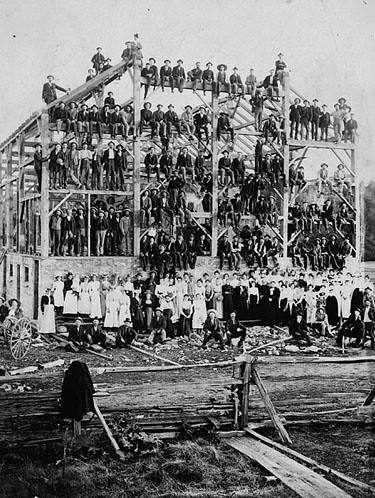
Amish barn raising. File Photo
The Amish and Social Security
In 1935, congress passed The Social Security Act. Included in this legislation was "Old Age, Survivors, and Disability Insurance," provided for those in industry and commerce, and extended to include farm operators in 1955. The Amish Country News writes:
While the Amish have no objection "paying unto Caesar what is Caesar’s," they do have problems with commercial insurance. In a sense, insurance was seen as not trusting in G-d. Insurance plans were a worldly operation. Plus, the Amish view of separation of church and state normally meant not accepting money from government programs, especially something viewed as welfare. No one could deny that this program was one of paying money to the government and then receiving a benefit in return.
Perhaps most importantly, the care of the elderly is seen as the responsibility of the family and community, not the government. Whether it be additions built onto the main house where grandparents "retire," benefit sales to pay large medical bills, or the community effort of a barn-raising, the Amish truly try to "take care of their own."
The Social Security Tax was administered by the Internal Revenue Service, beginning in earnest during the 1950's Though Old Age, Survivors, and Disability Insurance was clearly in the description, it was collected as a tax. The issue came to a head when the IRS seized the horses of one Valentine Byler for non-payment of the tax. Public sentiment was stirred as Byler depended on these horses for his livelihood as a farmer.
He received letters of support such as this one from Texas: "May I congratulate you on having the intestinal fortitude to stand up for your beliefs. While I am aware that your action stemmed from a love of your religion rather than from defiance, I hope that your example may serve to point out to some of us just how far our benevolent Government will go to reach its goal of making dependents of us all. There seems to be no place for a person who asks merely to be left alone, and to provide for himself and his family."
In 1961, Amish bishops sent the following petition to the IRS:
We, as representatives of the Old Order Amish Mennonite Church, do herein express our deep appreciation, and with grateful hearts do we recount the favors and consideration accorded our forefathers in the past...
We believe in a supreme being and also the constitution of the USA, and we feel the Social Security Act and Old Age Survivors Insurance [OASI] is abridging and infringing to our religious freedom. We believe in giving alms in the church according to Christ’s teaching.
It has been our Christian concern from birth of our church group to supply those of our group who have a need, financial or otherwise... Our faith has always been sufficient to meet the needs as they come about, and we feel the present OASI is an infringement on our responsibilities; as a church we feel grieved that this OASI has come upon us...
We Bishops, representatives of the Old Order Churches of the USA are appealing to you to prayerfully consider and reconsider this favor. In G-d we trust."
Ironically, relief was finally forthcoming to the Amish in a provision that was tacked on to the 1965 legislation that established Medicare. Wayne Fisher writes: "Tucked into the 138 page bill was a clause exempting the Old Order Amish, and any other religious sect who conscientiously objected to insurance, from paying Social Security payments, providing that sect had been in existence since December 31, 1950. After Senate approval in July, the signing of the bill by President Lyndon B. Johnson on August 13, 1965, made it official and canceled tax accounts of some 15,000 Amish people amounting to nearly $250,000." [2.]
John Jay on Right of Conscience
Consciences of men are not the objects of human legislation…How beautiful appears our expansive constitution in disclaiming all jurisdiction over the souls of men, and securing (by a never-to-be-repealed section) the voluntary, unchecked, moral suasion of every individual.”
— John Jay, the original Chief Justice of the U.S. Supreme Court on the right of conscience in the Constitution
A Better Way, Understanding
[click to read]
David Gelernter in the WSJ (Subscription Required)
Constructive national dialogue begins with understanding and that requires going beyond the ‘popular’ caricature. (read more)
Remind the people to be subject to rulers and authorities, to be obedient, to be ready to do whatever is good, to slander no one, to be peaceable and considerate, and always to be gentle toward everyone. At one time we too were foolish, disobedient, deceived and enslaved by all kinds of passions and pleasures. We lived in malice and envy, being hated and hating one another. But when the kindness and love of God our Savior appeared, he saved us, not because of righteous things we had done, but because of his mercy. He saved us through the washing of rebirth and renewal by the Holy Spirit, whom he poured out on us generously through Jesus Christ our Savior, so that, having been justified by his grace, we might become heirs having the hope of eternal life. This is a trustworthy saying. And I want you to stress these things, so that those who have trusted in God may be careful to devote themselves to doing what is good. These things are excellent and profitable for everyone.” – Titus 3:1-8
In the Garden
Charles A. Miles, 1913, Public Domain

In the Garden. Photo by Bob Kirchman
I come to the garden alone,
While the dew is still on the roses,
And the voice I hear falling on my ear
The Son of God discloses.
Refrain:
And He walks with me, and He talks with me,
And He tells me I am His own;
And the joy we share as we tarry there,
None other has ever known.
He speaks, and the sound of His voice
Is so sweet the birds hush their singing,
And the melody that He gave to me
Within my heart is ringing.
Refrain:
And He walks with me, and He talks with me,
And He tells me I am His own;
And the joy we share as we tarry there,
None other has ever known.
I’d stay in the garden with Him,
Though the night around me be falling,
But He bids me go; through the voice of woe
His voice to me is calling.
Refrain:
And He walks with me, and He talks with me,
And He tells me I am His own;
And the joy we share as we tarry there,
None other has ever known.
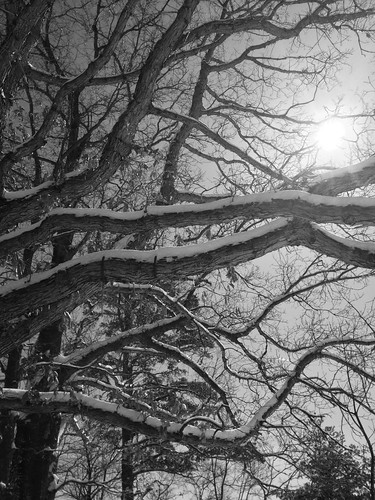
Oak branches in snow. Photo by Bob Kirchman
A Restful Walk on a Ridge
Shenandoah Mountain Trail

Shenandoah Mountain Trail begins at this overlook on U. S. 250 at the Western border of Augusta County where Confederate troops from Georgia once manned Fort Edward Johnson,...
Photo by Bob Kirchman
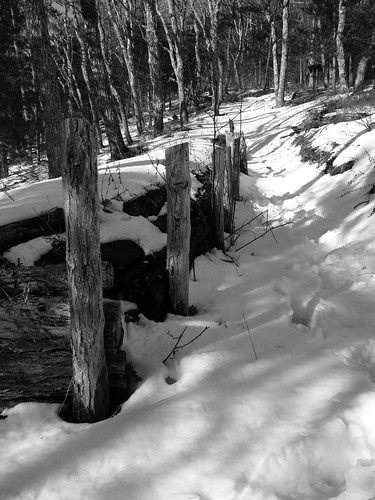
...shivering in a late Spring snow in 1862.
Photo by Bob Kirchman

Snowy trail. Photo by Bob Kirchman

Mountain Laurel. Photo by Bob Kirchman

Restful Ridgetop. Photo by Bob Kirchman
Lessons from a Dollhouse
By Bob Kirchman
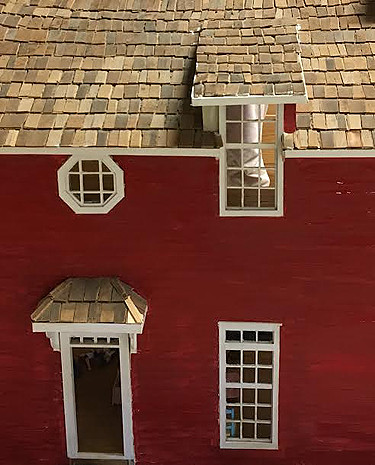
“Wisdom hath builded her house, she hath hewn out her seven pillars” – Proverbs 9:1
On a Saturday afternoon that was too cold and wet for outside play, my oldest granddaughter made a wonderful ‘discovery’ in the basement shelves. She found her mother’s dollhouse. Of course she wanted me to take it down for her and she enjoyed exploring it, but it wasn’t long before she wanted to keep hold of the magic. With mom’s approval we started planning some ‘improvements’ to the house. The little house would once again ‘live’ in daylight.
The little house, you must know, did not begin its life as a project for my daughter. Actually she was still pretty small when I made the house for our neighbor’s foster child, who stayed at our house afternoons after school. My daughter had plenty of blessings from grandparents. This little girl did not. The original house took shape out of spare parts and paints from the model shop where I built architectural models. When it was done it was painted in the rather bland ‘spec’ colors the designers of the day demanded. Still, it was a wonderful part of a little girl’s life. When she got older and went to live with family in another state, she gave my daughter the house.
At that point the interior underwent a major makeover at the hands of my daughter. It truly became her dollhouse. But the little house – like the wonderful houses in Williamsburg – or any multi-generational house for that matter, had already a wonderful history of blessing to it. Now my granddaughter took up the task. “Can we paint it red?” she asked. “My room is sage green but I REALLY like RED!” she sort of absently wondered. “Sure,” I said, and the project began. With a little help from me, my granddaughter selected the color to be painted on the siding. We got the paint from Walmart, where you can buy some really nice little bottles of acrylic paint for fifty cents for 2 ounces. Surely I would need more to cover ‘spec’ tan siding with deep red, so I looked at the larger bottles: eight ounces for $2.50.
My mother was an engineer/mathematician for the Martin Company in Baltimore in the 1940s. She would take her slide rule to the grocery store and often exclaimed that the bigger size was not cheaper. Mom invented unit pricing! I could feel her smiling from Heaven as I walked out of the store with four little bottles of red paint! My pneumonia bout put off our painting party for a bit but soon enough my granddaughter had a half day off from kindergarten. We set to work! Even with the strongly charged brush of a five year old, I was amazed at the coverage of the little paint bottles. We had two coats on the house before we finished the first two once bottle! I fixed the door of the house and it was time to play! There was one more surprise for that day involving the little house though. When two year old little sister showed up, brimming with curiosity, the oldest granddaughter happily invited her into the play! With some judicious removing of the more delicate and small items, this became a wonderful thing!
Some possessions may ‘own’ us, demanding our energy for their upkeep and continued service, but I think some wonderful things truly come to serve us – to express the nature of our souls. They become an extension of our nobler selves – our servant’s hearts, reaching through generations. We need more of those things.
